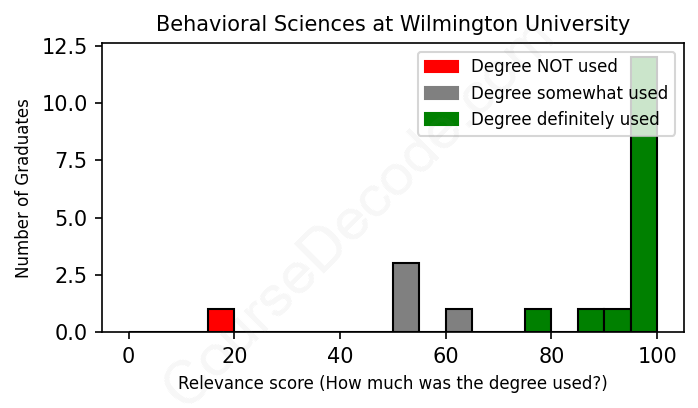
First, some facts. Of the Behavioral Sciences graduates from Wilmington University we've analyzed , here's how many have used (or NOT used) their degree in their career:

These are estimates based on AI analysis of 20 LinkedIn profiles (see below).
The verdict? Significantly above average. Overall, with an average relevance score of 84%, Behavioral Sciences graduates from Wilmington University have a much higher likelihood (+17%) of finding work in this field compared to the average graduate across all fields:
And for comparison, here's the chart for all profiles we've looked at across all degrees.
Also, after graduating, 60% of these graduates have pursued further education other than another Bachelor's degree (such as a Masters degree or other), compared to the average across all profiles of 35%. This suggests you may need more than just a Bachelors degree to be competitive as a Behavioral Sciences graduate.
See the details:
|
Relevance score: 50% We think this person has gone into a career only somewhat relevant to their degree. We think this person has gone into a career only somewhat relevant to their degree.
DEGREE INFOGraduated in 2011 from Wilmington University with a Bachelor of Science (B.S.) in Behavioral Sciences. No other secondary education since. JOB HISTORY SINCE GRADUATIONOwner/Photographer [NAME REMOVED] Raven Photography Mar 2012 - Present ABOUTSpecializing in custom teen & senior portraiture as well as creative concepts for artists, entrepreneurs and business professionals. |
The top 10 most common jobs done by the graduates we've analyzed (ranked most common to least) are:
When looking at the job paths of people who graduated with a degree in Behavioral Sciences from Wilmington University, you’ll notice a mix of roles that range in relevance to their studies. A good number of graduates ended up in positions like social workers, counselors, and therapists, which directly apply the principles learned in their programs. These roles often involve working closely with individuals in need of support, such as in mental health or community services, showcasing a strong connection between their education and their careers.
However, not all graduates found themselves in jobs that were related to Behavioral Sciences. Many took on roles like property managers, executive assistants, or even real estate agents, which lean more towards management or administrative skills rather than the behavioral understanding that their degree emphasizes. While some of these roles might touch on behavioral principles—like understanding client interactions and motivations—the direct application of their Behavioral Sciences knowledge is often minimal. Overall, it seems that while there are plenty of relevant positions within the behavioral field, graduates also ventured into diverse areas where their degree didn't play a pivotal role in their day-to-day tasks.
Here is a visual representation of the most common words in job titles for Behavioral Sciences graduates (this is across all Behavioral Sciences graduates we've analyzed, not just those who went to Wilmington University):

Graduates with a degree in Behavioral Sciences from Wilmington University seem to have pursued a variety of career paths that are both relevant and supportive of the skills they developed during their studies. Many of them started off in roles directly related to human services and counseling right after graduation. For instance, numerous alumni took on positions such as social workers, counselors, and rehabilitation specialists, indicating a strong inclination towards helping professions where they can apply their understanding of human behavior and mental health. These first jobs often laid a solid foundation for their careers, allowing them to gain practical experience and provide valuable services in their communities.
As these graduates moved further into their careers—around five to ten years post-graduation—it appears they have built upon their initial experiences, often advancing into more senior roles within the healthcare and behavioral health fields. For example, we see some individuals transitioning from entry-level counseling to positions like executive director or manager in health care settings. Others have diversified their careers by stepping into managerial roles or even entrepreneurship. While some have pursued unexpected paths, such as real estate or business management, a significant portion of graduates remains engaged in fields closely tied to Behavioral Sciences. Overall, it looks like many have successfully channeled their education into fulfilling careers, demonstrating that a Behavioral Sciences degree can indeed open many doors, especially in fields where understanding human behavior is paramount.
Getting a Bachelor’s degree in Behavioral Sciences at Wilmington University, or really anywhere, can be a mixed bag in terms of difficulty. It’s not the easiest degree out there, but it’s not the hardest either—definitely more on the manageable side, especially if you're interested in the subject. You’ll dive into topics like psychology, sociology, and maybe even some research methods, which can be pretty fascinating if you like understanding people and their behaviors. The coursework typically involves writing papers and some group projects, so if you’re good at organizing your thoughts and working in teams, you’ll probably find it pretty doable. Just be ready for some reading and critical thinking, but overall, as long as you keep up with your studies, it's a degree that many find rewarding without being overwhelmingly tough.
Most commonly, in the LinkedIn profiles we've looked at, it takes people 1 years to finish a Bachelor degree in Behavioral Sciences.
Looking at the job histories of these Wilmington University Behavioral Sciences graduates, it seems like they’ve had a pretty mixed bag in terms of earnings. Some have climbed the ladder into roles like Executive Director or Board Certified Behavior Analyst, which typically offer decent salaries, while others have stuck with positions that usually don’t pay as well, like Residential Counselor or Family Service Specialist. It also seems like many started out in more entry-level jobs and gradually moved up, which is pretty common in this field. Overall, if you’re aiming for a good paycheck in behavioral sciences, pursuing advanced roles and certifications seems to make a difference, but a few might be lagging behind in the earnings department. So, it really depends on the specific paths they chose!
Here is a visual representation of the most common words seen in the "about" section of LinkedIn profiles who have a Bachelor degree in Behavioral Sciences (this is across all Behavioral Sciences graduates we've analyzed, not just those who went to Wilmington University). This may or may not be useful:

Here are all colleges offering a Bachelor degree in Behavioral Sciences (ordered by the average relevance score of their Behavioral Sciences graduates, best to worst) where we have analyzed at least 10 of their graduates:
| College | Score | Count |
|---|---|---|
 Wilmington University Wilmington University
|
84 | 20 |
 Mercy College Mercy College
|
73 | 12 |
 Bellevue University Bellevue University
|
68 | 18 |
 Utah Valley University Utah Valley University
|
64 | 18 |